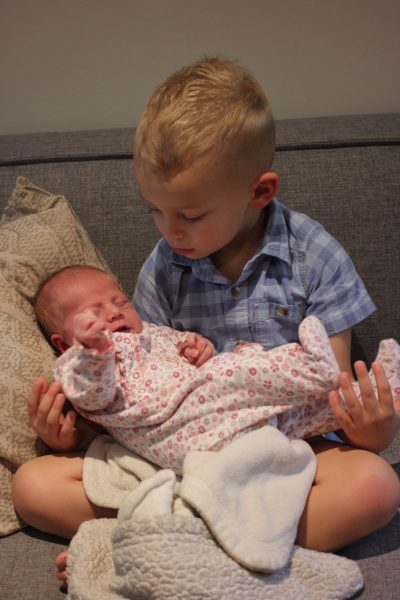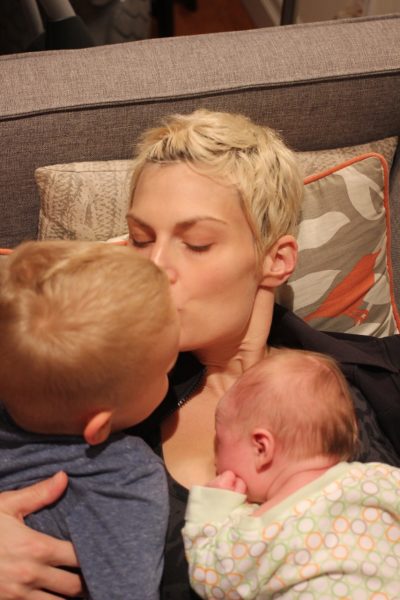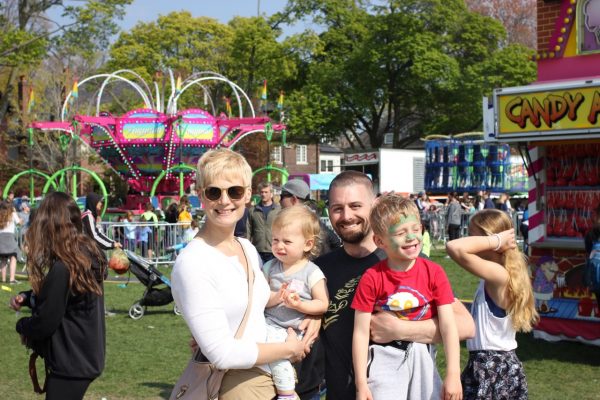Guest-blog by Amanda McGoey
When people heard we were expecting our second child, and that is was going to be a sister to our four year old son, they told me, “You will have the million-dollar family!”. I knew what they meant. Isn’t it nice to have two kids, one boy, one girl, perfectly matching the set of mom and dad? Yes, it sounded, and is, lovely.
I never really wanted a big family.
As an only child, I was used to having my space and some peace and quiet, but after we had our first child it felt inevitable that we would have a second. My first pregnancy was great, I felt fantastic, the baby was healthy and (with the support of amazing midwives) I had a long but normal labour and delivery. I remember the days and weeks after having our son as a challenge. Little sleep led to feelings of fogginess, and feeling a bit overwhelmed on what to do when the baby wouldn’t stop crying. But I also remember getting through it and not thinking too much about it. This is in stark contrast to how I felt after having my second child.
I expected it to be easier the second time.
Again, I was fortunate to have a great pregnancy, and with the same midwives had a fantastic, quicker, labour and delivery at the Toronto Birth Centre. My mom came to town to take care of our son, so my husband and I could just get up and go when I went into labour, allowing us to focus on ourselves and the new little girl we were about to meet.
Things are different with the second.
I very clearly remember delivering my daughter (in a tub full of hot bath water — it was great!), hanging out at the Birth Centre for a few hours and then catching a cab with my husband and taking her home. We were greeted by my very excited son, and an equally excited grandmother. From the second we walked in the door, though, we just kept going on like we always did. There was no real down-time, none of that cozy, private cocoon-like state you get when the first is born, where you and your spouse hunker down with the new babe for a week, just the three of you. Nope, when our daughter came home we just kept on keeping on. I actually went downstairs and put a load of laundry in shortly after I got home — probably about four hours after my daughter was born!

Why do I think this is relevant?
I have to wonder if not taking some time to absorb what just happened, not taking a moment to just be, contributed in some way to the overwhelming anxiety I felt for the first three months of my daughter’s life. It was like nothing I had ever experienced before.
I have worked in healthcare for over six years now, and before that studied Psychology. I’ve been a proponent for mental health for a very long time.
I understand how important it is to take care of yourself, and I know better than most how to navigate the healthcare system. I understand that while focusing on physical health is sometimes easier to do, taking care of one’s mental health is equally (if not more) important. I am always very supportive when someone tells me they are seeing a therapist; it always seems like the right thing to do in those situations and I would never judge someone or think differently of them if I knew they were receiving that kind of support. That’s why, when I was overcome by pretty severe anxiety after the birth of my daughter, it wasn’t surprising; I knew exactly what it was. But, I was still completely unprepared to deal with it.
Why is it that educated, healthy, well-connected women like myself (not to mention less-advantaged women), still feel this overwhelming sense of failure when we experience postpartum depression and/or anxiety?
We know intellectually that this is a possibility – all the books, our doctors, midwives and other mothers tell us that it can happen, and that it is OK if it does. But when it happens to us we are paralyzed. Both my husband and I knew I was not myself. At our postpartum checkups the midwives kept asking if I was feeling any of the things that would be red flags, and what to do if I felt that way (which I did). But somehow I just muddled through, didn’t talk about it, hoping it would go away. Then I’d dread the approach of every evening, knowing how hard it would be.
That’s what my trigger was: Sleep, or rather, the lack of it.
I would get so worked up in the afternoons anticipating how I would be up all night with the baby. I knew that I could get through a one-night occurrence, but for me, there was no end in sight. Again, I knew rationally that the sleepless nights would pass, and sooner rather than later we would all be sleeping again, just like what happened with my son, but this time I couldn’t see that. I would just worry about how horrible another sleepless night would be, and nothing could get me out of the funk.
I did pretty well during the day.
I was enjoying time with my baby, getting out of the house to see friends, and going to a postpartum exercise class (on the days when I wasn’t exhausted). Then dusk would come and I would start feeling this overwhelming sense of doom.
I would become very anxious. Unable to eat. An absolute nightmare to be around. I couldn’t get myself out of this downward spiral. My husband would try to help me, knowing that something was wrong. He wanted me to stop going down that rabbit-hole, and I became irritated and hurt because I couldn’t stop it. Despite wanting to help, he just couldn’t seem to understand what I was going through. It became a strain on our marriage.
I also wasn’t connecting with my son the same way I was used to, I would snap at him for no reason and then feel terrible afterwards. I missed the relationship we used to have, when all my attention could be on him, when it was just the three of us.

I didn’t resent having our daughter; I loved her fiercely, but I did not know how to get back on track.
Being around friends was helpful. I would talk to them about how I was super-focused on sleep training. At this point my baby was only four months old, so I know how crazy that sounds. But it was the only thing I felt like I had control over. The truth was, I had no control over it. And the fact that it wasn’t working just made me feel worse. Then I would have the friends who would say that they didn’t mind being up all night with their babies, especially when they knew that baby would be their last, they just enjoyed it. “Bullshit”, I thought. “How is that possible and why are you saying that to me?”. The reality is, they had no idea I was struggling so much, and they did truly feel that way.
My lowest point was one day in early winter about two months after my second baby was born.
We put the Christmas tree up that day, one of my favourite things to do during the holidays. My hubby had the Bailey’s ready, and we put on the Christmas carols, but I had NO interest. I just felt anxious. It was all awful, nothing was right and everything sucked. We tried to pick things up by taking our son to the movies that afternoon (the babe was still young enough that we could all go together). We walked to the theatre, which was great, and for a bit I was feeling better.
As the movie went on I started feeling more anxious. By the time we left I was crawling out of my skin. By the time we got to the restaurant to eat, I was pretty much freaking out. We got take-out, and I cried all the way home. I had the baby in a carrier, and tried to walk quickly in front of my son and husband so they wouldn’t see me sobbing. I couldn’t stop.
Something had to change. But how would that change happen?
I still had this sense of failure, and even though I needed help, I immediately went to a place in my mind where if I reached out and asked for help everyone would see that I was having a hard time, and that meant I would have to go on medication, and that meant that I could no longer breastfeed my baby, and that meant I was a total failure. Talk about a downward spiral!
Then, without warning, the anxiety lifted just the same way it came.
I was still tired and sometimes grumpy about that, but all of a sudden I could breathe again. I could laugh again. I could sit and watch a show after the baby was in bed, and not just sit on the edge of the couch waiting for her to wake up. The four of us were able to connect as a unit and have become quite the squad ever since. I am very lucky.
I don’t know if it was just time that caused the anxiety to leave, or if it was the realization that I needed help that actually allowed me to let go.
All I know is that all of a sudden I felt better. I didn’t actually go to anyone for help. The toughest thing about all of this is that if it were to happen again, I don’t think I would do anything differently. We are done having kids so I don’t actually have to worry about that, but I can say with some confidence that if I had a baby tomorrow (and felt the same anxiety and depression), I don’t know if I would do anything differently. I think it comes from the fact that I still associate getting help with failing, and I know that many women feel the same way.
Why are we so afraid of failing, or even just the perception of failing?
I think society as a whole is on the right path on this front; at least we are saying the right things. Women are speaking out more about their experiences, celebrities are on the front page of magazines saying they have felt the same way, health practitioners are giving women a heads-up that this happens to more of us than we realize and that it can be dealt with, though many of us still choose to fight the battle in silence. This worries me, because I think I was lucky to get out of this by myself. I don’t want other women to feel the way that I did, to feel that asking for help and support means they are a failure. I knew 100% that’s not true but that knowledge wasn’t enough.
So what is the takeaway? How can things get better?
Strong communities and support networks are hugely important. Those days that I felt exhausted but still dragged my butt to the “Mommy and Baby Boot Camp” felt better, because I felt more like myself, and what I was going through felt more normal. But in hindsight I still needed more.
I think that as a community we have to speak up.
If we see a woman struggling or talking about the challenges she is having in a way that seems like she is being dismissive (but she keeps bringing it up), we need to support her to get the help she needs. We need to hold ourselves accountable to look out for those who can’t look out for themselves the way they need to. We need to step up and say, “It is not OK that you feel this way! It isn’t your fault, let me help you!”. Hopefully, the overwhelming feelings will just be a moment in time and hopefully things will get better as quickly as they got bad but we can’t just stand by and watch: We need to step up.
Sometimes the hardest things for women to say is that they can’t do it all on their own, and that they need help.
Just writing this makes me feel awkward, but I know it’s true. To do this though, our communities need the tools to be able to start those conversations, to know what to say and what behaviours are red flags. This survey is a good place to start.
Communities of any kind — mommy groups, gyms, coffee shops, playgrounds — are so important. Even in this digital age where people can feel connected and isolated at the same time, it still takes a village to raise a child. Each one of us needs to step up and be a leader in that village, and support those who may need a lift, while also accepting the support that we are offered.
The fact that I got out of it on my own doesn’t mean I’m going to let other women struggle through these feelings by themselves.
I’m challenging myself to be a better friend, a better advocate, and someone who won’t let new moms deal with postpartum depression and anxiety on their own. I want you to join me, and make sure that our friends, colleagues and families know that we have their backs.

by: Amanda McGoey, One Strong Mother.
Editor’s note: Iron Lion Training strongly supports Amanda’s community oriented, “leave no woman behind” approach! In our experience, most people are about one workout away from feeling a bit better. If you’d like to be part of our fun and functional exercise community please contact us!
Email us at: info@ironliontraining.ca
Call: 647-998-5466(LION)







